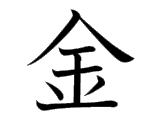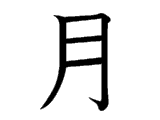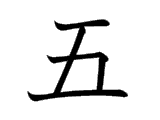So, we continued on grammar. After we have a little lesson for kanji and some vocabulary. Now, i will explain about grammer. Its very simple and according to me, easier than english. For example,
"I drink coffee"
In japanese, we got
"watashi wa koohii wo nomu" 「わたしはコーヒーを飲む」
in english pattern : [S] [V] [O]
in japanese pattern: [S] [O] [V]
so different with english isn't it?
and in japanese, there are some particle.
「は」 ha, it pronounced as wa if following a subject. It's for Subject marker
「を」 wo, it pronounced as o. It's for Direct Object Marker
「も」 mo, For too (similar) meaning.
「と」 to, it means and.
「へ」 he, it for direction marker. Not pronounced as he, but e.
「に」ni, for direction or time marker, indirect object marker
Tuesday, March 16, 2010
Basic Grammer
Poster finders_keepers at 4:25 PM 0 comments
Saturday, March 13, 2010
Some vocabulary
hello.....
we meet again. this time i will add some vocabulary and its usually used in daily activities.
we start with greeting or aisatsu
おはようございます it mean good morning
こんにいちは it means good afternoon
こんばんは it means good night
when we introduce our self to the other people, we say
わたしは-your name-です。
-where you come from- からきました
どうぞよろしくおねがいします。
for example:
わたしはしんじです、 アメリカからきました、どうぞよろしくおねがいします。
Poster finders_keepers at 12:14 PM 0 comments
Saturday, March 6, 2010
Day
As i promised, I will explain about the day. First this the kanji we need
on:ニチ, ジツ
kun:ひ, -び, -か
meaning:day, sun, Japan
on:ゲツ, ガツ
kun:つき
meaning:month, moon
on:カ
kun:ひ, -び, ほ-
meaning:fire
on:スイ
kun:みず, みず-
meaning:water
on:ボク, モク
kun:き, こ-
meaning:tree, wood
on:キン, コン, ゴン
kun:かね, かな-, -がね
meaning:gold
on:ド, ト
kun:つち
meaning:soil, earth, ground, Turkey
and we need one more kanji
on:ヨウ
kun:
meaning:weekday
So what we do next is, combining them. And it will be like this
Sunday 日曜日 (にちようび)
Monday 月曜日 (げつようび)
Tuesday 火曜日 (かようび)
Wednesday 水曜日 (すいようび)
Thursday 木曜日 (もくようび)
Friday 金曜日 (きんよううび)
Saturday 土曜日 (どようび)
so that's it. I hope it will be useful to you all.
Poster finders_keepers at 8:01 PM 0 comments
Month
so, we continued on part 2 of my lesson. We learn about kanji that ussualy used in daily life in Japan. This time about a name of day and month. On my latest post we have learn kanji number, so we combine it with make them with this kanji :
on:ゲツ, ガツ
kun:つき
meaning:month, moon
so for emxample:
we have
一月 it read ichigatsu (いちがつ) it means January.
二月 にがつ "February"
三月 さんがつ "March"
四月 しがつ "April"
五月 ごがつ "May"
六月 ろくがつ "June"
七月 しちがつ "July"
八月 はちがつ "August"
九月 くがつ "September"
十月 じゅうがつ "October"
十一月 じゅういちがつ "November"
十二月 じゅうにがつ "December"
But, now Japanese didn't write the month same as my explanation above. It use a plain number, for example if it is January just 1月, just like that.
So it will be continued on my next post. I will post about the name of the day.
じゃ、またねえ
Poster finders_keepers at 7:39 PM 0 comments
Sunday, February 28, 2010
Learn Kanji Number
Before we start learn kanji, there are 2 way to spell a kanji reading. It's Onyomi (音読み) and Kunyomi (訓読み). Onyomi is a chinese reading, it means if 2
kanji becomes one, the reading of that kanji is based on their onyomi. But not always the reading of two kanji based on their onyomi. And i will explain it
later. The second is Kunyomi, kunyomi is a Japanese reading, it means that a kanji can be read and have a meaning on it. It is different with onyomi, if a
single kanji read in onyomi, it hadn't a meaning.
So we start in Kanji of Number, here we go
on:イチ, イツ
kun:ひと-, ひと.つ
meaning: One
on:ニ, ジ
kun:ふた, ふた.つ, ふたた.び
meaning: Two
on:サン, ゾウ
kun:み, み.つ, みっ.つ
meaning: Three
on:シ
kun:よ, よ.つ, よっ.つ, よん
meaning: Four
on:ゴ
kun:いつ, いつ.つ
meaning: five
on:ロク, リク
kun:む, む.つ, むっ.つ, むい
meaning: Six
on:シチ
kun:なな, なな.つ, なの
meaning: Seven
on:ハチ
kun:や, や.つ, やっ.つ, よう
meaning: Eight
on:キュウ, ク
kun:ここの, ここの.つ
meaning: nine
on:ジュウ, ジッ, ジュッ
kun:とお, と
meaning: Ten
Thats it for now. Next time i will add more kanji. じゃ、ここでおわります。
Poster finders_keepers at 8:48 PM 0 comments
Poster finders_keepers at 8:27 PM 0 comments
Origin of Kana (part 1)
As i promise, i will post the origin of kana. As i said earlier, kana is made from kanji. But with a simplified shape. But it had same spelling and looks like the original form. So i start with hiragana first, here they are:
Poster finders_keepers at 2:07 PM 0 comments

